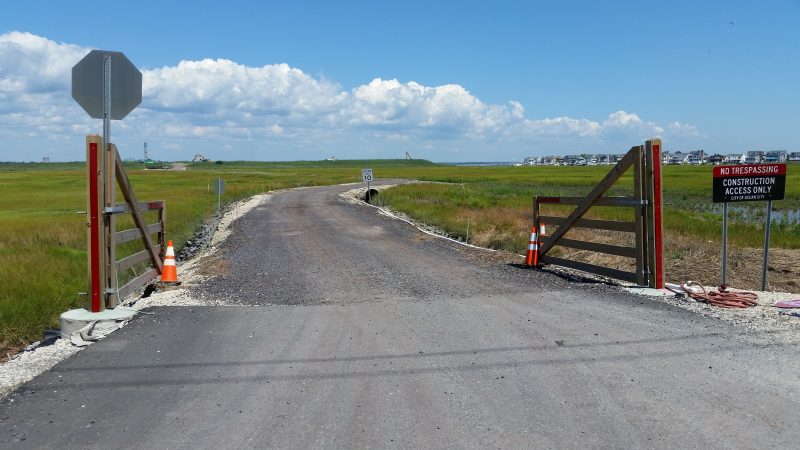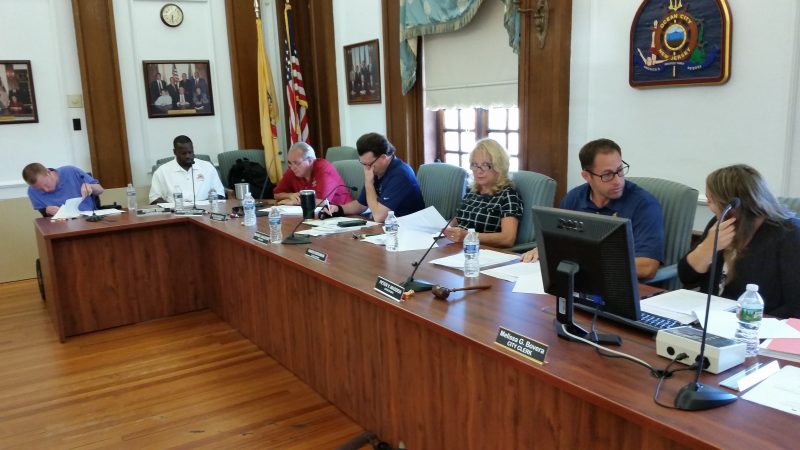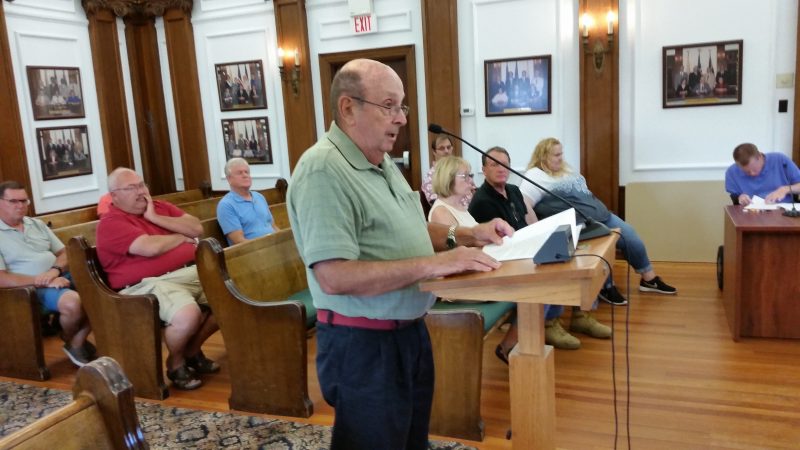Marty Mozzo, chairman of the Ocean City Environmental Commission, delivered an annual report to Council.
 By Donald Wittkowski
A new agreement approved Thursday will allow Ocean City to send sediment dredged from its lagoons and back bays to the town of Pleasantville, but some local residents believe the deal is a way for a wealthy community to dump its “toxic slime” on a poor municipality.
Ocean City wants to get rid of the muddy sediment as it moves ahead with a comprehensive dredging program, but Pleasantville plans to use the material as fill for its Lakes Bay waterfront redevelopment area, a proposed project that would include homes, retail shops and office space.
Although the agreement sounds mutually beneficial for both towns, three critics expressed fear that Pleasantville’s residents might be exposed to toxins possibly mixed in with the sediment. They also alleged that affluent Ocean City appears to be taking advantage of Pleasantville, an impoverished community.
“It’s like the rich community is dumping its spoils on the poorest community,” Ocean City resident Georgina Shanley said.
Shanley, her husband, Steven Fenichel, and Ocean City teacher Cynthia Hart spoke out against the agreement during Thursday’s City Council meeting. They urged Council not to go through with the deal.
However, Council unanimously approved the agreement after hearing assurances from its attorney that the dredge spoils undergo regular environmental testing and are not toxic.
“I don’t think the public has to worry that we’re foisting toxic material on Pleasantville,” City Solicitor Dorothy McCrosson said.
By Donald Wittkowski
A new agreement approved Thursday will allow Ocean City to send sediment dredged from its lagoons and back bays to the town of Pleasantville, but some local residents believe the deal is a way for a wealthy community to dump its “toxic slime” on a poor municipality.
Ocean City wants to get rid of the muddy sediment as it moves ahead with a comprehensive dredging program, but Pleasantville plans to use the material as fill for its Lakes Bay waterfront redevelopment area, a proposed project that would include homes, retail shops and office space.
Although the agreement sounds mutually beneficial for both towns, three critics expressed fear that Pleasantville’s residents might be exposed to toxins possibly mixed in with the sediment. They also alleged that affluent Ocean City appears to be taking advantage of Pleasantville, an impoverished community.
“It’s like the rich community is dumping its spoils on the poorest community,” Ocean City resident Georgina Shanley said.
Shanley, her husband, Steven Fenichel, and Ocean City teacher Cynthia Hart spoke out against the agreement during Thursday’s City Council meeting. They urged Council not to go through with the deal.
However, Council unanimously approved the agreement after hearing assurances from its attorney that the dredge spoils undergo regular environmental testing and are not toxic.
“I don’t think the public has to worry that we’re foisting toxic material on Pleasantville,” City Solicitor Dorothy McCrosson said.
 Council approved a new agreement to send sediment dredged from Ocean City's back bays to the town of Pleasantville.
McCrosson also said that the dredging industry is tightly regulated by the state Department of Environmental Protection, which requires Ocean City to follow stringent standards while providing even greater protection for Pleasantville’s residents.
“Every step of the way the DEP has standards we have to meet,” she said.
Hart, a teacher for 30 years, wanted Council to table the agreement until the results of toxicity tests on the dredge spoils could be published.
McCrosson said the public is free to request the results of environmental testing or other information on the dredging project from the DEP or the two towns.
Fenichel, a local doctor, likened the Ocean City-Pleasantville agreement to a bad Hollywood movie in which a well-to-do town dumps its “toxic slime” on a poor community. He characterized it as a “toxic gift from Ocean City.”
“Is this muck toxic? Fair question. How could it not be?” Fenichel asked, after alleging that the lagoons could have been polluted from discharge from the nearby B.L. England power plant.
A resolution approved by Council formalizing the agreement with Pleasantville noted that they dredge spoils “have been identified as appropriate materials for use at the Pleasantville site.”
Ocean City is in the midst of a three-year, $20 million dredging program to deepen its sediment-choked lagoons and back bays. Some of the lagoons are so shallow that boat owners are trapped at their slips or must wait until high tide to gain access to the water. The city’s marinas are also threatened by the thick sediment.
To clear out the lagoons, the city is planning a comprehensive dredging program that would span the island from “tip to tip.” An estimated 1 million cubic yards of sediment must be dredged from the lagoons and channels, enough muck to fill about 15 football stadiums.
Previously, Ocean City had an agreement with Wildwood to send its dredge spoils to that town to serve as cover, or “a cap,” for a landfill. The Wildwood landfill has since been capped, so Ocean City has been looking for other ways to dispose of the dredge spoils.
Ocean City Business Administrator Jim Mallon told Council that the city has been in discussions with Pleasantville about a “shared services agreement” for the dredge spoils. Echoing McCrosson’s statements, Mallon explained that the sediment must be tested before it is transported to Pleasantville
Under the agreement, Ocean City will pay Pleasantville $85 per cubic yard of dredge material to have the spoils removed. Pleasantville, in turn, plans to use the material to build up its Lakes Bay redevelopment area, a 38-acre bayfront tract that has been eyed for years as a site for new homes and commercial projects.
Council approved a new agreement to send sediment dredged from Ocean City's back bays to the town of Pleasantville.
McCrosson also said that the dredging industry is tightly regulated by the state Department of Environmental Protection, which requires Ocean City to follow stringent standards while providing even greater protection for Pleasantville’s residents.
“Every step of the way the DEP has standards we have to meet,” she said.
Hart, a teacher for 30 years, wanted Council to table the agreement until the results of toxicity tests on the dredge spoils could be published.
McCrosson said the public is free to request the results of environmental testing or other information on the dredging project from the DEP or the two towns.
Fenichel, a local doctor, likened the Ocean City-Pleasantville agreement to a bad Hollywood movie in which a well-to-do town dumps its “toxic slime” on a poor community. He characterized it as a “toxic gift from Ocean City.”
“Is this muck toxic? Fair question. How could it not be?” Fenichel asked, after alleging that the lagoons could have been polluted from discharge from the nearby B.L. England power plant.
A resolution approved by Council formalizing the agreement with Pleasantville noted that they dredge spoils “have been identified as appropriate materials for use at the Pleasantville site.”
Ocean City is in the midst of a three-year, $20 million dredging program to deepen its sediment-choked lagoons and back bays. Some of the lagoons are so shallow that boat owners are trapped at their slips or must wait until high tide to gain access to the water. The city’s marinas are also threatened by the thick sediment.
To clear out the lagoons, the city is planning a comprehensive dredging program that would span the island from “tip to tip.” An estimated 1 million cubic yards of sediment must be dredged from the lagoons and channels, enough muck to fill about 15 football stadiums.
Previously, Ocean City had an agreement with Wildwood to send its dredge spoils to that town to serve as cover, or “a cap,” for a landfill. The Wildwood landfill has since been capped, so Ocean City has been looking for other ways to dispose of the dredge spoils.
Ocean City Business Administrator Jim Mallon told Council that the city has been in discussions with Pleasantville about a “shared services agreement” for the dredge spoils. Echoing McCrosson’s statements, Mallon explained that the sediment must be tested before it is transported to Pleasantville
Under the agreement, Ocean City will pay Pleasantville $85 per cubic yard of dredge material to have the spoils removed. Pleasantville, in turn, plans to use the material to build up its Lakes Bay redevelopment area, a 38-acre bayfront tract that has been eyed for years as a site for new homes and commercial projects.
 Marty Mozzo, chairman of the Ocean City Environmental Commission, delivered an annual report to Council.
Also at Thursday’s Council meeting, the chairman of the Ocean City Environmental Commission gave an annual report that praised the town’s efforts to protect the environment.
Marty Mozzo, who has headed the commission for about three years, said the commission serves as an important tool for educating the public about the ocean, beaches, dunes and wildlife. He also said the commission will occasionally act as a watchdog group to safeguard the environment and the public.
“Our goals are ambitious as an environmental commission,” Mozzo said, while thanking Council and Mayor Jay Gillian’s administration for their support.
Marty Mozzo, chairman of the Ocean City Environmental Commission, delivered an annual report to Council.
Also at Thursday’s Council meeting, the chairman of the Ocean City Environmental Commission gave an annual report that praised the town’s efforts to protect the environment.
Marty Mozzo, who has headed the commission for about three years, said the commission serves as an important tool for educating the public about the ocean, beaches, dunes and wildlife. He also said the commission will occasionally act as a watchdog group to safeguard the environment and the public.
“Our goals are ambitious as an environmental commission,” Mozzo said, while thanking Council and Mayor Jay Gillian’s administration for their support.